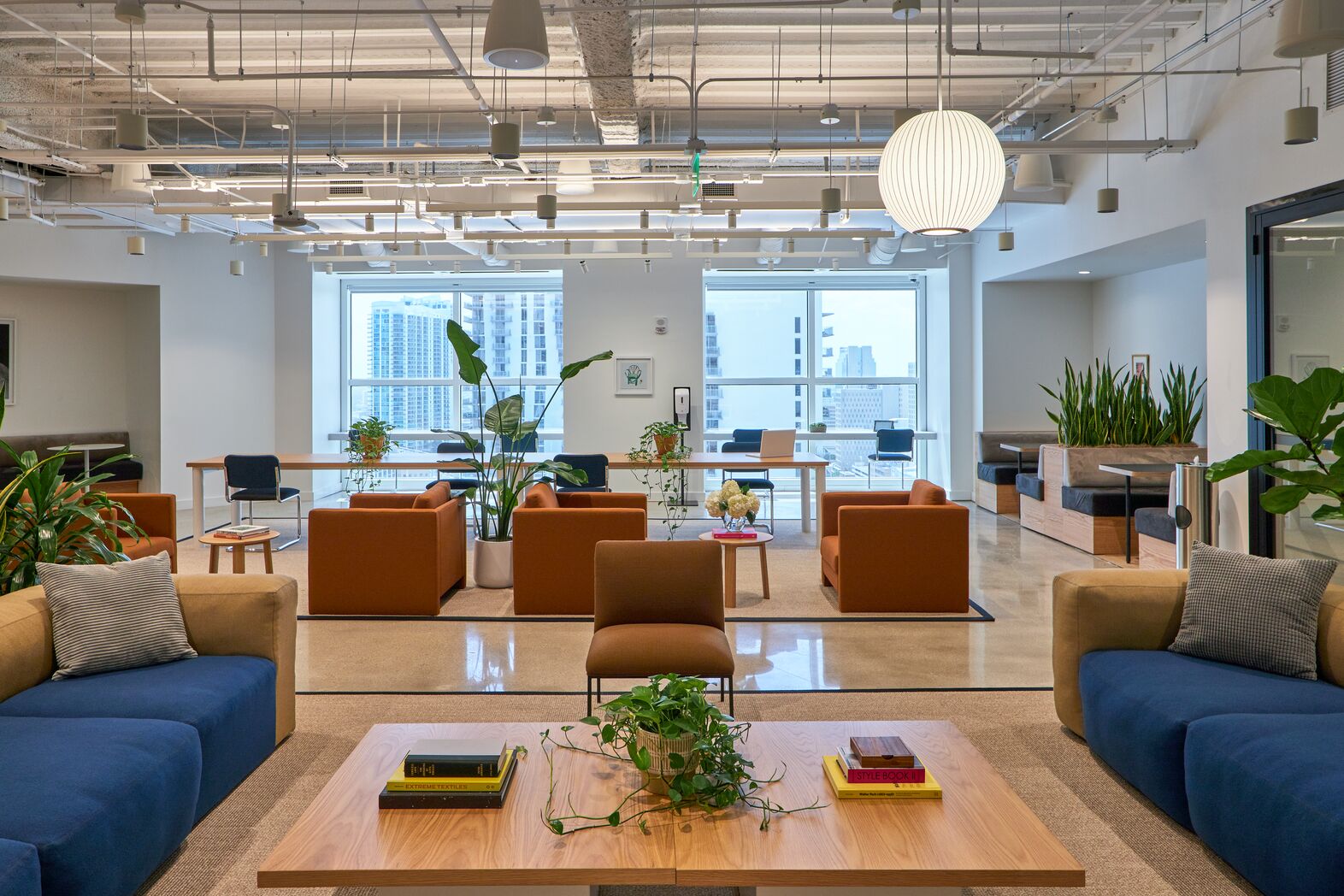Now that companies across the globe are moving to a hybrid work model, many founders and CEOs are turning to WeWork’s private office spaces and WeWork All Access. Doing so helps protect their bottom line in an increasingly unpredictable world, lessening the stress of having capital expenditures tied up in real estate, infrastructure, and office equipment during times of economic uncertainty.
Another reason is that joining WeWork affords a high level of flexibility. Whether a company has employees located throughout the world or in a single city, it can combine one or more private offices with one or more WeWork All Access passes, which provide individual team members with access to hundreds of WeWork locations worldwide. Intentionally designed WeWork spaces, flooded with natural light and populated with plants and art, provide a consistent office experience for employees, no matter what city they’re in. That makes it easy for companies to uphold and nurture their organizational values, which invariably center on culture, connection, and collaboration.
Private offices and WeWork All Access both operate on a monthly membership basis, which helps companies remain agile during uncertain times. Both solutions come with standard WeWork amenities, including bookable meeting and event spaces, cleaning services, and access to printers.
Here are three very different WeWork members who combine these two workspace solutions in different ways but to similar ends: to balance flexibility and structure, to attract the best talent wherever it may be, and to maintain a high level of employee satisfaction by offering beautiful workspace with plenty of perks in thriving neighborhoods.
Global delivery service looks for flexibility and connection
Sendle, the first carbon-neutral shipping service in the U.S. and Australia, started out as a remote-first company when it was founded in Seattle in 2014. As the company grew, so did the desire for consistent, comfortable workspaces where its teams could meet if needed. “We tend to be highly productive working remotely, so [it was more] about how we [could] enhance that with the in-person experience,” says Nicole Olver, Sendle’s chief people officer.
The challenge
Since the Sendle team was spread across the United States, Australia, New Zealand, and the Philippines and continuing to expand, the company needed workspace that could scale—but they didn’t know by how much or how fast. “We wanted a [space] that would give us the flexibility to grow,” says Eva Ross, Sendle’s chief marketing and customer officer. “Like any startup, you don’t know how big you’re going to be.”
The solution
Sendle turned to WeWork, and in 2019 the company opened dedicated offices at WeWork 100 Harris Street in Sydney and WeWork 1201 3rd Avenue in Seattle, where employees in those cities could gather in person for meetings or enjoy uninterrupted, heads-down time away from the distractions of home.
Sendle also wanted to provide alternative workspace options for its team members in other cities. In early 2021, the company provided all of its employees with WeWork All Access memberships, enabling them to work at almost any WeWork location in the world.
The result
WeWork All Access gives Sendle employees choices and flexibility, says Ross. “[They] head over to the WeWork nearest to them and still have that consistent experience they always expect of WeWork, but in an area that’s closer to their home,” says Ross.
Sendle teams everywhere now have access to a workspace where they can engage with others and stave off feelings of isolation. “We always see our people joining virtual events [organized by WeWork], whether it’s a quick meditation session or a trivia day,” says Olver, noting that this solution also removes some of the pressure of building culture remotely, from scratch. “We can streamline into something that’s already happening.”
A SaaS startup reclaims its collaborative energy post-pandemic
Before the pandemic, remote work never used to be an option for Unearth, a location-based data management platform based in Seattle. The startup was built on the in-person dynamic of creativity and innovation among its tight-knit team, who consider one another family. The 20 employees worked out of a traditional, 5,000-square-foot commercial office space that offered plenty of room to expand the team. “We were definitely planning to grow into [the space],” says Brian Saab, Unearth’s cofounder and CEO—but the pandemic had other ideas.
The challenge
When employees went home to work in March 2020, Unearth worked hard to maintain its close-knit culture remotely, through Zoom coffee chats, meetings, and remote team-building activities.
When Unearth’s office lease was up in August 2021, Saab decided not to renew it—the pandemic’s course was still uncertain, and employees weren’t ready to return to in-person work. “The space was no longer designed for what we needed,” Saab says. During the 17 months of remote work, the team had maintained its close ties and collaborative spirit, even as it continued to grow. Employees liked the flexibility of working remotely, so Saab asked them what kind of workspace situation they wanted moving forward. While employees wanted to continue with a flexible work model, says Saab, “the underlying sentiment was that folks did miss one another. They missed in-person collaboration.”
The solution
Saab turned to WeWork for a flexible office space solution. He came away with WeWork All Access memberships for Unearth’s 27 employees, which allowed them to work from almost any WeWork location around the world. Soon after, Unearth leased two private, dedicated offices at WeWork 500 Yale Ave N in Seattle, which serves as its central headquarters.
The result
At least 85 percent of the company’s staff had worked out of a WeWork space within a month of receiving their memberships, Saab says. Employees quickly started holding weekly meetups, gathering to brainstorm ideas, collaborate on projects, share a meal, and attend meetings in WeWork’s bookable conference rooms.
Saab says that WeWork All Access and the dedicated offices at WeWork 500 Yale Ave N have brought the company together again with a level of connectivity they couldn’t get as a remote-only organization. “There is an irreplaceable value to in-person connection,” says Saab. “[In-person] collaboration is key to Unearth’s company culture, and WeWork spaces ensure teams can share ideas openly and innovate.”
A cloud communications platform scales fast and flexibly
Dialpad has followed a hybrid work model since its inception in 2011—long before flexible workplaces were the norm. Created to provide organizations with a single, cloud-based app for all of their internal and external communications, the platform’s built-in AI creates real-time transcriptions, automated call summaries, and other assets so parties on a call can give the conversation their full attention.
The challenge
The idea of collaborating through multiple channels across various locations is baked into Dialpad’s ethos—the company was built on the promise of being able to hire top talent no matter their geographic location. A WeWork member since 2017, Dialpad had a central, dedicated office for employees to use as needed, but rapid growth and entry into new markets made it more challenging to maintain its supportive culture. “Our main goal,” says Tasha Liniger, Dialpad’s chief human resources officer, “is to provide folks with an alternative to just working in their homes.”
The solution
Dialpad turned to WeWork for a solution and found the flexibility it needed to scale in WeWork All Access. “When we have Dialers in a region where we don’t currently have an office space, we give them WeWork All Access passes so they can be part of a community,” says Liniger.
The result
Dialpad has the agility needed to quickly expand into new markets. Once a new location is deemed viable and has the talent it needs to succeed, says Liniger, the company opens a new, dedicated office at a local WeWork. To date, the company has offices in Japan, India, England, Australia, and the U.S.—all located in WeWork buildings.
Liniger says that WeWork enables Dialpad to provide a great experience for employees all over the world. “WeWork helps us be flexible, nimble, adaptable, and to pivot quickly as the markets change and the opportunity changes,” she says. “That is what we are harnessing as one of our superpowers, and it’s one of the major values in our partnership.”
Kristen Bailey is a veteran writer and editor based in beautiful Lincoln, Nebraska. She has a penchant for helping large and small brands create stories that tell the why.
Want to learn more about flexible work?










